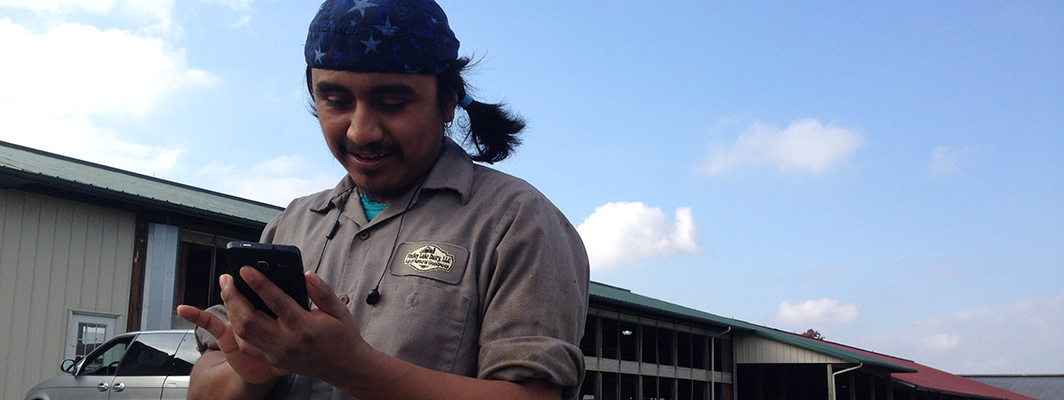
Growing up in Oaxaca, Mexico, Octaviano was forced to leave school before completing the first grade. For the next 20 years, his only “academic skill” was the ability to write his own name. A seasonal farm hand, Octaviano continued that work when he moved to the United States, until an accident left him unable to. It was then that he decided to learn English and work toward becoming a U.S. citizen. His plan was solid, except for the fact that he made this decision while living in a rural area that did not offer many educational opportunities for adult learners.
To help students like Octaviano, adult education programs across the country are finding new approaches that incorporate simple technologies to engage students outside of the traditional classroom. The result: more students are being served who without technology would be left out of the educational system.
While the idea of a mobile teaching lab is not necessarily new, our Beacon site in New York, Orleans/Niagara Board of Cooperative Educational Services (ONBOCES), takes the concept to a new level. They currently deploy 10 teachers in the two counties they serve to reach the many migrant laborers who work in area dairy farms and orchards and can’t easily attend in-person education programs. Teachers at ONBOCES are equipped with mobile devices that include Rosetta Stone and other language apps. They also bring portable hubs so they can help students learn about the web as they improve their English. As a result of this approach, every year, 300 migrant laborers in Orleans County are able to gain skills anytime and anywhere.
“It’s really kind of wild,” Chuck Diemert, ONBOCES’ Literacy Zone Coordinator, said. “Imagine a teacher on a bench in an orchard teaching students basic English. We want them to go further academically, but these students don’t have transportation, and they can’t afford mobile devices, so we have to go to them.”
In Providence, R.I., the situation for immigrants is quite different than it is in Orleans County. The Rhode Island Family Literacy Initiative (RIFLI), our Beacon in the state, provides digital literacy classes designed for ESL students. Though the programs are popular and successful, RIFLI’s leadership realized it wasn’t enough to give students access to computers in class. They needed to find a way for students who could not afford even the most basic technology to be able to practice their skills at home. “As with most students, at-home practice is key because it allows them to experiment and practice without the fear of being ‘wrong,’” said Larry Britt, RIFLI’s Technology Specialist.
To make this happen, RIFLI joined forces with the Providence Public Library system so students in their computer classes could check out tablets and hubs. Currently, RIFLI is able to loan out 22 tablets at any time, but they are working to double that number this year.
Latdavanh, a student from Laos, benefited from RIFLI’s Computers for ESL class. As a low-level restaurant worker since coming to the U.S., she took advantage of the check-out program in order to practice her Excel skills at home. As a result, she has taken on more responsibilities at work and has even shown her boss how to use Excel to keep track of inventory.
Today, because of that experience and her newfound digital confidence (Latdavanh is now comfortable ordering supplies, using email, and doing Google searches for information), she is interested in starting her own restaurant.
Another model for engaging adult learners outside of the classroom, and perhaps the ideal for adult education students, is access to anytime, anywhere learning. In many areas, this is becoming viable thanks to the widespread use of cell phones. Unfortunately, however, even if students can afford to have a phone, they often cannot afford data plans. Our Beacon site in Texas, Community Action, is partnering with Cell-Ed, a non-profit technology company out of California, to create a workaround. Cell-Ed created an ESL program that operates on any cell phone. Students listen to short pre-recorded lessons by phone and interact with their teacher/mentors via text, so no data plans are necessary.
As is the case with ONBOCES and RIFLI, the technology being used is not particularly cutting edge; the power is in how that technology is deployed. Recently, a cohort of janitors in the Leander Independent School District, who can only attend class on Saturdays, has used Cell-Ed to supplement their in-class instruction. After just one term, a custodian named Teresa was able to interview for a more advanced position. She says she got the job because she was able to do the interview in English, which was a result of being able to practice her English with Cell-Ed on her own time.
Adult education programs are pushing the boundaries of the traditional classroom and helping students like Octaviano achieve their goals. Octaviano was able to improve his English through ONBOCES’ outreach efforts. He was also able to pass his citizenship exam. He was named Adult Student of the Year in Albany, and now plans to enroll in community college.
Octaviano’s path, as is the case with many others like him, has not been an easy one. But, simple technologies deployed intelligently have made that path just a bit easier.